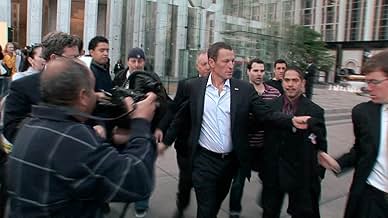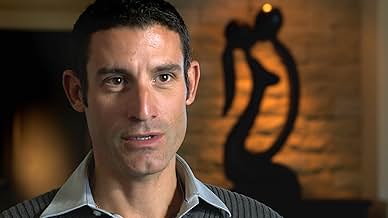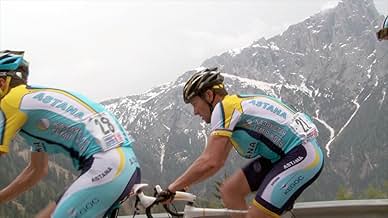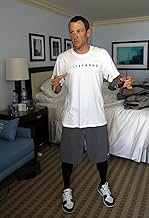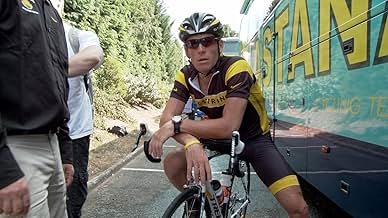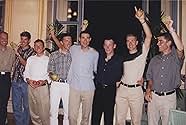IMDb-BEWERTUNG
7,2/10
8216
IHRE BEWERTUNG
Füge eine Handlung in deiner Sprache hinzuA documentary chronicling sports legend Lance Armstrong's improbable rise and ultimate fall from grace.A documentary chronicling sports legend Lance Armstrong's improbable rise and ultimate fall from grace.A documentary chronicling sports legend Lance Armstrong's improbable rise and ultimate fall from grace.
- Nominiert für 1 BAFTA Award
- 2 Gewinne & 8 Nominierungen insgesamt
Michael Bloomberg
- Self - NYC Mayor
- (Archivfilmmaterial)
Bill Clinton Jr.
- Self - Former US President
- (Archivfilmmaterial)
Anderson Cooper
- Self - Interviewer
- (Archivfilmmaterial)
Sheryl Crow
- Self - Lance's Girlfriend
- (Archivfilmmaterial)
Alex Gibney
- Self - Narrator
- (Synchronisation)
Tyler Hamilton
- Self - Teammate
- (Archivfilmmaterial)
Empfohlene Bewertungen
Many were shocked when Lance Armstrong (finally) admitted to his use of steroids, which assisted in his 7 Tour Du France wins. Stripped of his titles, dumped by his multi-million dollar sponsorships, banned from all World Anti-Doping Agency governed sports, and literally taken out of the record books for all 7 years he won, most expected him to experience a deep shame and regret over his actions. Most of us, upon revealing our deepest secrets, and the lies that we chose to live, might respond in that way, but Lance Armstrong is a different kind of person, and perhaps doesn't function in the same capacity.
Oscar winning documentary film maker Alex Gibney tackles another societal dysfunction, in his attempt to tell the story of why one of sporting world's most famous names, would come out to admit his fraud to the world. It's an absolutely spellbinding story, and doesn't tip-toe around the subject. Rather, it opens up at his most publicly shameful moments, when he told Oprah Winfrey on national television (in yes / no fashion) that he had been cheating the whole time he was winning one of the most grueling competitions in the world. But there is a great deal more to this story, and Gibney delves into some of the bigger problems surrounding the sport, his issues with bullying team mates, the nature of cheating, and most importantly: Why Armstrong acts the way he does.
The American Psychiatric Association defines the narcissistic personality as:
"In which a person is excessively preoccupied with personal adequacy, power, prestige and/or vanity, mentally unable to see the destructive damage they are causing to themselves and often others."
Whenever I think of this personality, a few names come to mind (Donald Trump, and Kanye West are just a few), but I think Lance Armstrong fits this description well. I don't particularly think that he, and others who share these traits, are necessarily terrible people, but it does make them capable of some truly awful actions. It's a remarkable study into this type of personality. Armstrong admits to wrong-doings, but never feels remorse for his actions. It's remarkable how he treats his own teammates throughout his career, and forces us to see him as a very driven man, yet at the same time, one capable of very criminal action.
At this time, in 2016, Armstrong faces a 100 million dollar lawsuit brought forth by the federal government for defrauding the U.S. Postal service (the main sponsor during his tours). It's expected to ruin him financially, but many don't expect a decision requiring a full penalty. Perhaps his actions do have consequences, but he's apt not to let that bother him. That being said, Alex Gibney narrates and describes the situation facing him and sport of cycling rather well. I would recommend this documentary to anyone who was interested in Armstrong as a competitor, but also to really let the depth of his actions sink in with the viewer.
One of Gibney's best, and more personal documentaries.
8/10
Oscar winning documentary film maker Alex Gibney tackles another societal dysfunction, in his attempt to tell the story of why one of sporting world's most famous names, would come out to admit his fraud to the world. It's an absolutely spellbinding story, and doesn't tip-toe around the subject. Rather, it opens up at his most publicly shameful moments, when he told Oprah Winfrey on national television (in yes / no fashion) that he had been cheating the whole time he was winning one of the most grueling competitions in the world. But there is a great deal more to this story, and Gibney delves into some of the bigger problems surrounding the sport, his issues with bullying team mates, the nature of cheating, and most importantly: Why Armstrong acts the way he does.
The American Psychiatric Association defines the narcissistic personality as:
"In which a person is excessively preoccupied with personal adequacy, power, prestige and/or vanity, mentally unable to see the destructive damage they are causing to themselves and often others."
Whenever I think of this personality, a few names come to mind (Donald Trump, and Kanye West are just a few), but I think Lance Armstrong fits this description well. I don't particularly think that he, and others who share these traits, are necessarily terrible people, but it does make them capable of some truly awful actions. It's a remarkable study into this type of personality. Armstrong admits to wrong-doings, but never feels remorse for his actions. It's remarkable how he treats his own teammates throughout his career, and forces us to see him as a very driven man, yet at the same time, one capable of very criminal action.
At this time, in 2016, Armstrong faces a 100 million dollar lawsuit brought forth by the federal government for defrauding the U.S. Postal service (the main sponsor during his tours). It's expected to ruin him financially, but many don't expect a decision requiring a full penalty. Perhaps his actions do have consequences, but he's apt not to let that bother him. That being said, Alex Gibney narrates and describes the situation facing him and sport of cycling rather well. I would recommend this documentary to anyone who was interested in Armstrong as a competitor, but also to really let the depth of his actions sink in with the viewer.
One of Gibney's best, and more personal documentaries.
8/10
THE ARMSTRONG LIE is a fascinating documentary. Shot over a period of four years, it purports to investigate the oft-repeated claim that cyclist Lance Armstrong was a cheat, and that every single one of his Tour de France wins were achieved by taking drugs. Alex Gibney's narrative begins as a defense of Armstrong's behavior, but as different elements of the truth emerge, so the filmmaker has to keep readjusting his position. Gibney is obviously a fan of Armstrong (as many people still are), but as the seamy details of what the cyclist did in order to win his races gradually emerge, so the filmmaker gradually understands how wrong-headed he has been give his unquestioning support. Armstrong emerges as a thoroughly unsavory character, pathologically unwilling to acknowledge the truth about himself, and always looking to manipulate the media so that he emerges in a positive light. Even his so-called 'confessional' interview with Oprah looks like a deliberate attempt to rescue his reputation. As the narrative unfolds, so Gibney gradually comes to understand the truth about his subject, and realizes to his cost that much of the film has unwittingly helped to obfuscate that truth, portraying Armstrong instead as a man more sinned against than sinning. It is only right at the end that Gibney admits the truth of Armstrong's motives, and how Armstrong himself has deliberately duped the filmmaker. As a result THE ARMSTRONG LIE is a film that is more about media manipulation than anything else, revealing just how persuasive - and dangerous - a person Armstrong actually is. There's no guarantee that he might not manage to clear his reputation in the future, despite what he has done.
Review: After watching the Program recently, I thought I should watch the real story about Lance Armstrong, because I couldn't believe that a man could be so vindictive and manipulating to so many people, and now that I've watched this in depth documentary, he was worse than I first expected. The fact that he nearly got away with taking drugs during his 7 championship races, sickens my stomach and I personally think that he should be stripped of all of his personal earnings, which he has made from his deception and bare-faced lies. He ruined so many people's life's, including his fellow racers and he damaged there reputations by claiming that they were lying about his drug taking. Because of the power that he gained during his cycling career, he had the backing of some very important people, who helped him through his successful career but when the truth came out about his filthy habits, he tarnished there reputations and made loads of money after coming clean. His excuses for taking the enhanced performing drugs, were that it was the norm at that time and there wasn't any tests that could track the drugs, and the only reason why he got caught, even though there was loads of investigations, was because he returned to cycling after retiring with his 7 consistent wins. Anyway, I found the documentary very entertaining and well put together by the director and the various interviews with the people who surrounded Lance Armstrong at that time, proved that he really wasn't a nice person. The sad thing is, he actually could have won a few of the championships without the drugs! Enjoyable!
Round-Up: This documentary was directed by Alex Gibney, 62, whose known for his documentaries and his in depth look into debatable matters. He won an Oscar for Taxi To The Dark Side in 2008 and he was nominated for an Oscar in 2006 for Efron: The Smartest Guys In The Room. He's directed documentaries about WikiLeaks, James Brown, musical artist Fela Kuti, Steve Jobs, Frank Sinatra and various political matters. Judging by this film, he's not one to hold back information and he does get down to the nitty gritty when it comes to delicate situations, so I'm looking forward to watching some more of his projects.
Budget: N/A Worldwide Gross: $500,000
I recommend this movie to people who are into their sport/documentaries about Lance Armstrong's rise and fall from grace. 7/10
Round-Up: This documentary was directed by Alex Gibney, 62, whose known for his documentaries and his in depth look into debatable matters. He won an Oscar for Taxi To The Dark Side in 2008 and he was nominated for an Oscar in 2006 for Efron: The Smartest Guys In The Room. He's directed documentaries about WikiLeaks, James Brown, musical artist Fela Kuti, Steve Jobs, Frank Sinatra and various political matters. Judging by this film, he's not one to hold back information and he does get down to the nitty gritty when it comes to delicate situations, so I'm looking forward to watching some more of his projects.
Budget: N/A Worldwide Gross: $500,000
I recommend this movie to people who are into their sport/documentaries about Lance Armstrong's rise and fall from grace. 7/10
This movie - and the situation it chronicles - forces us to consider
to what extent we can expect an even playing field - literally - when we watch sports. The athletes say, "Every one else was doing it."
When fans watch NASCAR races, I hope they understand that it's a team sport. The people who built the car, the people who maintain it, the guys who change the tires, the spotters and others contribute as much or more to the win as does the driver. However, when we see an individual athlete - biker, runner, skier, etc. - compete, do we see that the "best man" wins or the performer with the best doctor, the best chemist and research department and the cleverest lawyer to get around the system, as one of the interviewees in this movie suggests.
Should we accept that performance enhancements are now a part of sports, athletes and their supporters will continue to find ways to counter efforts to limit them and accept that? The destructive qualities of steroids - including their potential for violent behavior and the process Armstrong admitted using raise doubt. The drug Amstrong took and the use of blood transfusions to short-cut the body's process for communicating and responding to muscle fatigue surely must be physically destructive. However, I have long had questions about the long-term effects of professional football tackles, questions now being answered, at least in terms of head injuries. Players and fans continue to accept this.
This movie may be more interesting to people who are not cycling fans but is a good exploration of a range of observers and participants.
to what extent we can expect an even playing field - literally - when we watch sports. The athletes say, "Every one else was doing it."
When fans watch NASCAR races, I hope they understand that it's a team sport. The people who built the car, the people who maintain it, the guys who change the tires, the spotters and others contribute as much or more to the win as does the driver. However, when we see an individual athlete - biker, runner, skier, etc. - compete, do we see that the "best man" wins or the performer with the best doctor, the best chemist and research department and the cleverest lawyer to get around the system, as one of the interviewees in this movie suggests.
Should we accept that performance enhancements are now a part of sports, athletes and their supporters will continue to find ways to counter efforts to limit them and accept that? The destructive qualities of steroids - including their potential for violent behavior and the process Armstrong admitted using raise doubt. The drug Amstrong took and the use of blood transfusions to short-cut the body's process for communicating and responding to muscle fatigue surely must be physically destructive. However, I have long had questions about the long-term effects of professional football tackles, questions now being answered, at least in terms of head injuries. Players and fans continue to accept this.
This movie may be more interesting to people who are not cycling fans but is a good exploration of a range of observers and participants.
When everyone cheats, it becomes a different contest. The powerful friends, money (125 million plus), risk and pain tolerance, influential scientists, compelling story, performance enhancing drugs, viciousness, ambition to win at all costs, willingness to bully others, . . . Armstrong has all this and more. The documentary is a powerful and gripping indictment not just of Armstrong and cycling, but of sports and humanity in general. Armstrong's doping is bad, but his abuse of power is worse. The film shows how willing people are to be fooled, or to trample on others. Despite its two-hour length, the film held my interest throughout. There are so many parallels in a short story by Nathaniel Hawthorne, wherein he writes, "There is something truer and more real, than what we can see with the eyes, and touch with the finger." So too with Armstrong, cycling, sports, and all of us. This brilliant documentary helps bring such truths to the surface.
Wusstest du schon
- WissenswertesFilmmaker Alex Gibney followed Lance Armstrong for four years with the intent of chronicling his return to cycling after retirement as Armstrong tried to win his eighth Tour de France. Unexpectedly, Gibney was also there when Armstrong admitted to doping, which resulted in the film being retitled from "The Road Back" to "The Armstrong Lie."
- Zitate
Lance Armstrong: I viewed my battle with cancer as an athletic competition. But in that, you either win or you lose. When you lose, or if you lose, you die. So I took that perspective, which is a little dark, and I put it into everything I've done since then. I like to win. But more than anything, I can't stand the idea of losing, because, to me, that equals death.
- VerbindungenFeatured in At the Movies: Venice Film Festival 2013 (2013)
Top-Auswahl
Melde dich zum Bewerten an und greife auf die Watchlist für personalisierte Empfehlungen zu.
- How long is The Armstrong Lie?Powered by Alexa
Details
- Erscheinungsdatum
- Herkunftsland
- Offizieller Standort
- Sprache
- Auch bekannt als
- Die Armstrong Lüge
- Produktionsfirmen
- Weitere beteiligte Unternehmen bei IMDbPro anzeigen
Box Office
- Bruttoertrag in den USA und Kanada
- 383.294 $
- Eröffnungswochenende in den USA und in Kanada
- 28.992 $
- 10. Nov. 2013
- Weltweiter Bruttoertrag
- 594.394 $
- Laufzeit
- 2 Std. 4 Min.(124 min)
- Farbe
- Sound-Mix
Zu dieser Seite beitragen
Bearbeitung vorschlagen oder fehlenden Inhalt hinzufügen







